Vegan Slaughterhouse Reflections
Notes – on a very enjoyable 30 minutes – spent here in the ‘Ernest Bell Library’ / ‘The Humanitarian League’ offices in Hong Kong – discussing: –
-
Watermelons – the plant has been cultivated in Egypt since at least the 2nd millennium BC and by the 10th century AD had reached India and China. Wiki.
-
Ernest H. Crosby – an American reformer and author – was President of the New York Social Reform Club – was actively interested in the labor movement – was a strong anti-imperialist – was an opponent of war – was President of the New York Anti-Imperialists’ League – was President of the New York Vegetarian Society. Wiki.
-
Henry S. Salt – an English writer and campaigner for social reform in the fields of prisons, schools, economic institutions, and the treatment of animals. He was a noted ethical vegetarian, anti-vivisectionist, socialist, and pacifist, and was well known as a literary critic, biographer, classical scholar and naturalist. Wiki.
-
Edward Carpenter – an English socialist poet, philosopher, anthologist, opponent of vivisection, vegetarian and early LGBT activist. Wiki.
-
WW1 Conscientious Objectors – “individual who has claimed the right to refuse to perform military service” on the grounds of freedom of thought, conscience, and/or religion. Wiki.
-
Freethinking – a philosophical viewpoint which holds that positions regarding truth should be formed on the basis of logic, reason, and empiricism, rather than authority, tradition, or other dogmas. Wiki.
————————————–
VEGAN SLAUGHTERHOUSE
In our incoming messages a few days ago, was an image so powerful that it stopped work in the office & had everyone talking around a computer screen – ……and asking for copies! Chris Corliss of Vegan Empire & Out for Blood Clothing had added text to a photo & sent it viral on Nov 20.
~ Chris – I found the photo on google search and added the text “Vegan Slaughter House”. And uploaded it in the Vegan Humor Group on Facebook. ~
The source
vegan slaughterhouse. pic.twitter.com/V9NKRa7sKA
— Ⓥarsity Kale (@varsityvegan) November 18, 2014
The original image as a .jpeg file.
HappyCow, Facebook, Instagram, Twitter have all made sharing veganism much easier / much more fun!
————————————–
Then the conversation shifted to –
Watermelon Steaks!
From Wikipedia – ~ Watermelon steaks are steak-shaped pieces of watermelon, often prepared by grilling. The steaks can also be cooked by pan frying, by baking, or by marination followed by roasting. Depending on the method used, cooking can take from a few minutes to over two hours.
Some who have tried it compare its texture to that of seared meat, while others claim it is unique in its taste and texture. It is called “watermelon steak” due to its appearance and texture. ~
————————————–
……then we had to take this little ‘Humanitarian League’ booklet from our library shelves & read some Ernest H. Crosby!
Then, our copy of Henry S. Salt‘s autobiography – SEVENTY YEARS AMONG SAVAGES – had to also be taken down.
You will find links to read both of these online – below.
….so from the arrival of the VEGAN SLAUGHTERHOUSE watermelon photo, we had a very enjoyable 30+ minutes of discussing & reading!
Thank you Chris!
————————————–
.
.
.
.
.
.
Ernest H. Crosby & Henry S. Salt notes
Ernest H. Crosby did not manage to make the full shift to veganism when he stopped eating meat 120+ years ago – but he did amazing propaganda work for both animal rights & human rights for many years.
Ernest H. Crosby in his essay –‘The Meat Fetish’ – read it online – here.
….on transitioning to veganism –
P21 ~ And now a word of practical advice to those who may feel inclined to experiment in the direction indicated. It is well to do things gradually; not that a sudden change need cause any trouble, but you would probably expect it to, and your expectations might make you imagine that it had. Begin by eating meat only once a day; then, after a month or two, drop it altogether, but still eat fish for a time. Take care meanwhile to substitute the foods rich in proteids – the cereals, wholewheat bread, peas and beans, cheese and eggs. Eventually it may be best to drop eggs and dairy products too, but it is difficult to do it if you live with others, and I have not yet been able in my own case. It is a very easy change to make, to give up meat. If you have plenty of other food, you will not feel any deprivation at all. I know what it is to have given up tobacco, and it was a serious struggle, and I blame no one for failing in the attempt, but I have never had the slightest inclination to go back to meat; and the idea is now disagreeable, and the smell of a butcher’s shop or of a kitchen where bacon is frying is most offensive to me. ~
….on slaughterhouses –
P5 – ~ From the aesthetic point of view slaughter-houses are blots upon the face of the earth, and in half-unconscious recognition of this fact we usually hide them away out of sight. It is quite possible, indeed, to go through life without ever seeing one. At the present moment I can only recall three which have ever come into my field of vision. One was out in the country, in the midst of the beautiful intervale of New Hampshire. An ugly board shanty in the fields, with a pile of hideous offal at one side and a sickening stench to leeward, to us children it was like an outpost of hell in the midst of heaven, and we shunned it instinctively and turned our eyes away. The second was the municipal abattoir of Alexandria in Egypt, for once built out in plain view of the railway, with melancholy strings of buffaloes and other cattle waiting their turn in front. Once I walked along the shore of the Mediterranean behind it, not far from the foundations of Cleopatra’s palace, but I had to leap across rivulets of blood running down into that poetic sea, and the smell was almost overpowering, so that I never passed that way again. The third slaughterhouse of my experience was, of all places, at Venice. I had secured a gondolier of singular resourcefulness, and after he had exhausted his list of churches and galleries, he brought me through out-of-the-way canals to the Palace of Butchery, and was chagrined when I declined to go in and insisted on being conveyed elsewhere. I shall never forget the forbidding look of the place nor the lowing and bellowing of the kine concealed somewhere in its foul recesses. ~
Some Old Vocabulary
Proteids = now we use ‘proteins’.
Intervale = a word commonly used in rural New Brunswick, Canada, to refer to the rich fertile bottomland along rivers and streams.
Offal = the viscera and trimmings of a butchered animal.
Leeward = adjective & adverb = on or towards the side sheltered from the wind; downwind.
Kine = an old English plural form of ‘cow’ – “the lowing kine came home at twilight”
Gondolier = a person who propels and steers a gondola (a boat) – a (Venetian) boatman who propels a gondola.
Palace of Butchery = Crosby’s ironic term for a slaughterhouse.
Chagrin = verb – past participle: chagrined = feel distressed or humiliated. – “he was chagrined when his friend poured scorn on him”
————————————–
Ernest Howard Crosby (1856–1907) was an American reformer and author, born in New York City, the son of Presbyterian minister Howard Crosby, and a relative of prolific hymn-writer and rescue mission worker Fanny Crosby. Wiki.
A bio – http://libertarian-labyrinth.org/archive/ Ernest_Howard_Crosby: _A_Biographical_Sketch
Quote –
~ Mr. Crosby’s interests in New York City are many, however. Among others he was the organizer and first President of the New York Social Reform Club; he is actively interested in the labor movement; he is a strong anti-imperialist and opponent of war, and has been the President of the New York Anti-Imperialists’ League since its formation; he is President of the New York Vegetarian Society, and also of the Civic Council. ~ – by Charles Brodie Patterson, “Ernest Howard Crosby: A Biographical Sketch,” Mind 12, no. 3 (June 1903): 166-171.
————————————–
An introduction to Ernest H. Crosby in SEVENTY YEARS AMONG SAVAGES by Henry S. Salt – 1921 – read it online – here.
p205 & 206
~ Ernest Crosby, another philosophic anarchist, was perhaps as little known, in proportion to his great merits, as any writer of our time. Elected as a Republican to the Assembly of New York State, he had been appointed in 1889 to be a Judge of the International Court in Egypt ; but after serving there five years, his whole life was suddenly changed, owing largely to a book of Tolstoy’s which fell into his hands : he resigned his post, and thenceforward passed judgment on no man but himself. A poet and thinker of high order, he stood up with unfailing courage against the brute force of ” imperialism ” in its every form — the exploitation of one race by another race, of one class by another class, of the lower animals by mankind. It is strange that his writings, especially the volume entitled Swords and Plowshares, should be almost unknown to English democrats, for they include many poems which touch a very high standard of artistic excellence, and a few that are gems of verse. “The Tyrant’s Song,” for instance, expresses in a few lines the strength of the Non-Resistant, and of the conscientious objector to military service (” the man with folded arms “) ; yet during all the long controversy on that subject I never once saw it quoted or mentioned. A superficial likeness between Crosby’s unrhymed poetry and that of Edward Carpenter led in one case to an odd error on the part of an American friend to whom I had vainly commended Carpenter’s writings ; for in his joy over Swords and Plowshares he rashly jumped to the conclusion that “Ernest Crosby ” was a nom de plume for the other E.C. “I owe you a confession,” he wrote. ” Hitherto I have not been able to find in Carpenter anything that substantiated your admiration for him ; but now a flood of light is illuminating his Towards Democracy.” I communicated this discovery to the poets concerned, and they were both charmed by it.
Crosby was a tall handsome man, of almost military appearance, and this, too, was a cause of misapprehension ; for an English friend whom he visited, and who knew him only through his writings, spent a long afternoon with him without even discovering that he was the Crosby whose poems he admired. ~
Ernest H. Crosby’s poem on conscientious objectors / pacifists.
The Tyrants’ Song
‘Tis not the man with match alight
Behind the barricade,
Nor he who stoops to dynamite,
That makes us feel afraid.
For halter-end and prison-cell
Soon quench these brief alarms;
But where are found the means to quell
The man with folded arms ?
We dread the man who folds his arms
And tells the simple truth,
Whose strong, impetuous protest charms
The virgin ear of youth,
Who scorns the vengeance that we wreak,
And smiles to meet his doom,
Who on the scaffold still can speak,
And preaches from the tomb.
We kill the man with dagger drawn –
The man with loaded gun;
They never see the morning dawn
Nor hail the rising sun;
But who shall slay the immortal man
Whom nothing mortal harms,
Who never fought and never ran –
The man with folded arms?
————————————–
The Ernest Bell Library’s primary objectives are to: –
-
Collect all of Ernest Bell’s book & non-book works and make them easily accessible to everyone.
-
Collect the literature of vegetarianism and all the other humanitarian movements in which Ernest Bell was so deeply involved.
-
Assist students and scholars in their research.
-
Introduce all aspects of Ernest Bell’s life, including his writings, campaign work, influences and his circle of friends.
-
Undertake our own research into missing aspects of Ernest Bell’s life and work.
We already have more than 300 pieces of Ernest Bell’s own writings.
We are also actively building a collection of examples of promotional material, campaign material, fundraising & marketing activities etc. – related to: –
-
veg(etari)an products.
-
veg(etari)an books & other publications.
-
veg(etari)an organisations.
-
veg(etari)an businesses.
-
animal rights organisations.
-
animal rights publications.
-
humanitarian organisations.
-
humanitarian publications.
-
rambling clubs run by members of the above groups & related publications.
-
the work of Richard St. Barbe Baker & the ‘Men of the Trees’ organization & its many sub-branches

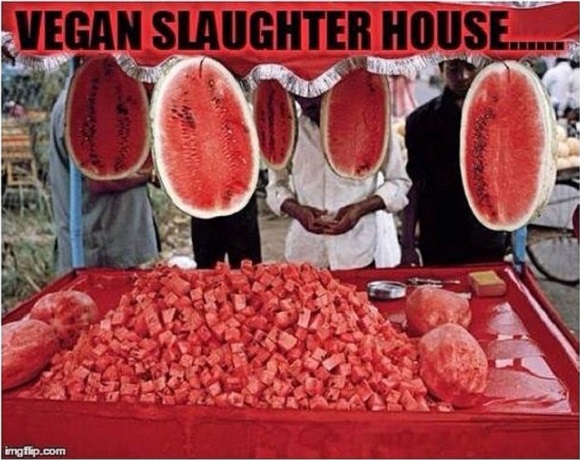


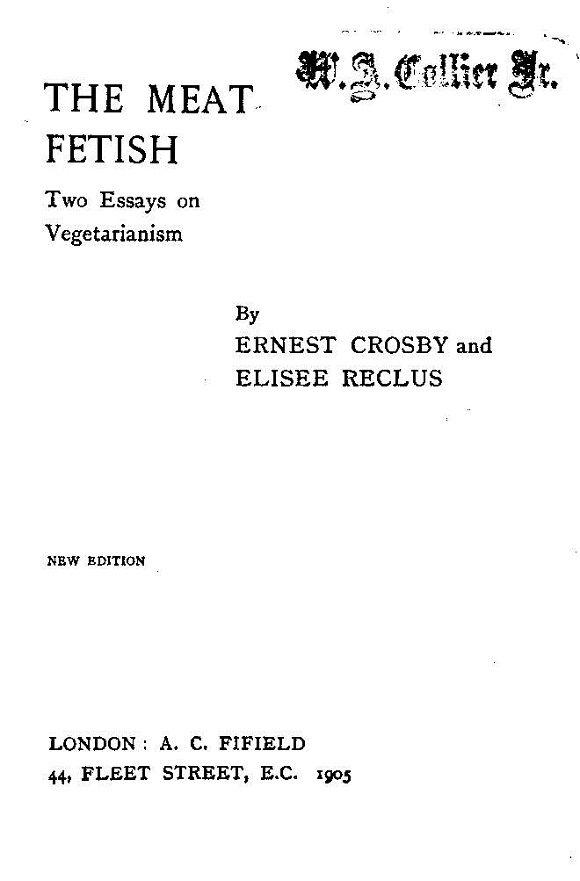

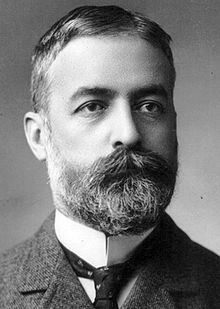
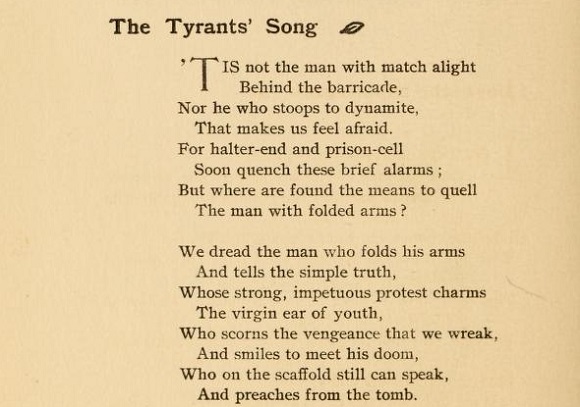


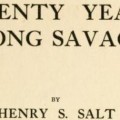
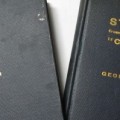
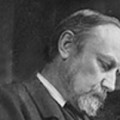
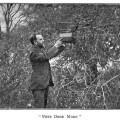
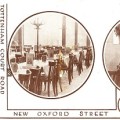
1 Comment
VeganBeader (8 comments)
December 17, 2014 at 11:23 pm“A poet and thinker of high order, he stood up with unfailing courage against the brute force of ” imperialism ” in its every form — the exploitation of one race by another race, of one class by another class, of the lower animals by mankind. ” I love HSS’ description of Ernest Crosby.